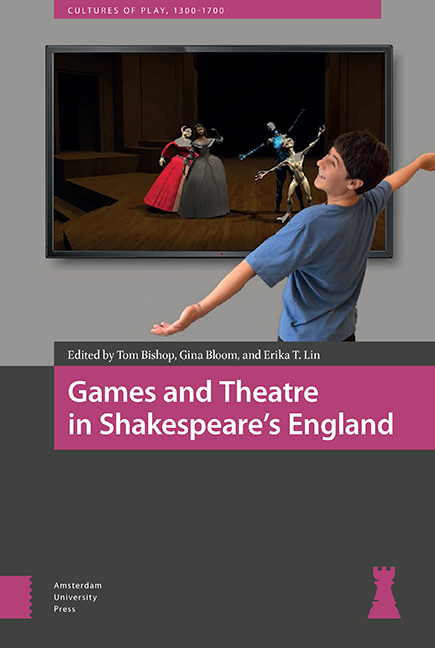1 - The Player's Game: The Activity of the Player in Early Modern Drama
Published online by Cambridge University Press: 21 October 2021
Summary
Abstract
In medieval England, games and plays were cognate activities. By Shakespeare’s time, “games” seem to have become a category distinct from drama, but the persistence of the term “player” suggests that theatrical performance was still considered a form of ludic activity. This essay historicizes the term “game”, thinking about the meanings of the word available to the early modern player and the ways in which those meanings are both similar to and different from those available to modern actors and directors. It then examines gamelike practice at the modern Shakespeare's Globe, considering the extent to which the contemporary experiment allows us any kind of insight into the early modern dramaturgy of the “game.”
Keywords: game; clowning; acting; players; improvisation
In medieval England, games and plays were cognate activities. The Latin term ludus was used to refer to both, and there was a substantial overlap between dramatic representations and other forms of ludic activity such as Misrule, May-games and mumming, in which participants also dressed up and adopted semi-fictional personas. In the fourteenth and fifteenth centuries, the English word “game” could be used to refer to performed drama, and even in the sixteenth century “game-player” was used as a term for what would now be called an actor. By Shakespeare's time, “games” seem to have become a category distinct from drama, but the persistence of the term “player” suggests that theatrical performance was still considered a form of ludic activity. Modern critics have often found it useful to think of early modern drama as gamelike in nature, and it is striking that the theatre practitioners involved in performance at the reconstructed Shakespeare’s Globe have also returned to the metaphor with some frequency. This essay will first historicize the term “game,” thinking about the meanings of the word available to the early modern player and the ways in which those meanings are both similar to and different from those available to modern actors and directors. It will then examine gamelike practice at the modern Globe, considering the extent to which the contemporary experiment allows us any kind of insight into the early modern dramaturgy of the “game.”
- Type
- Chapter
- Information
- Games and Theatre in Shakespeare's England , pp. 41 - 68Publisher: Amsterdam University PressPrint publication year: 2021



